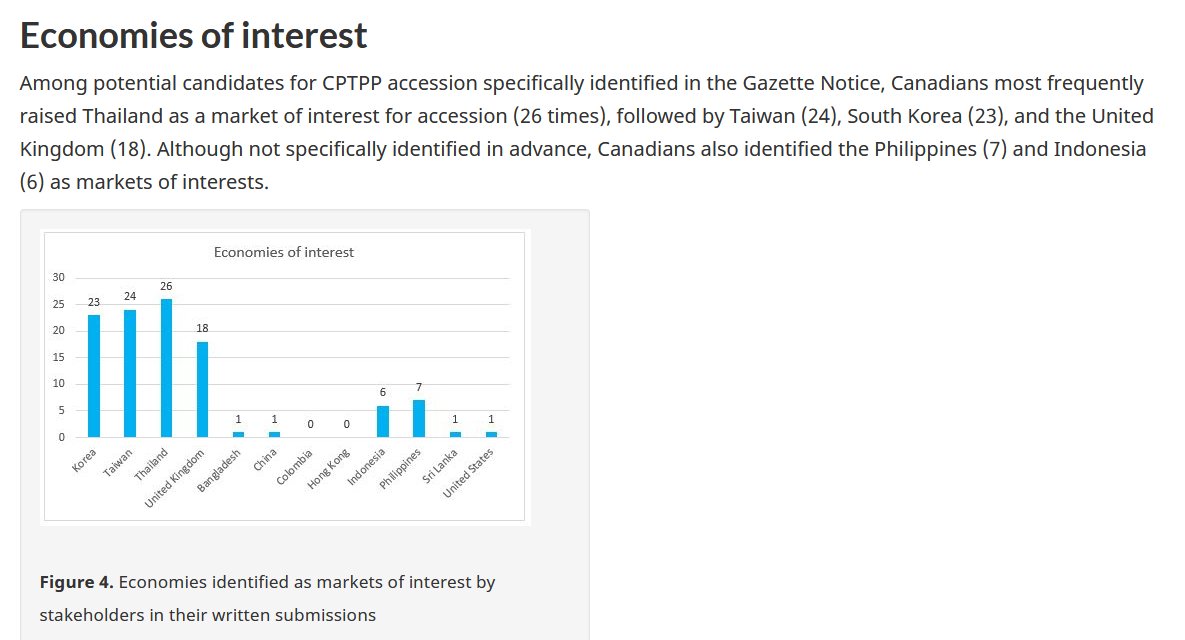So, the 11 members of the Comprehensive and Progressive Agreement Trans-Pacific Partnership (#CPTPP) have agreed to start negotiations for the UK to accede.
Many others have commented. I won't repeat them. Just a few points to consider
1/9 reuters.com/world/uk/trans…
Many others have commented. I won't repeat them. Just a few points to consider
1/9 reuters.com/world/uk/trans…
The statement mti.gov.sg/-/media/MTI/Mi…
Starting negotiations with the UK is only one part. The statement ends with: ministers and senior officials “hope that those Signatories for which the CPTPP has yet to enter into force will ratify the Agreement as soon as possible”
2/9
Starting negotiations with the UK is only one part. The statement ends with: ministers and senior officials “hope that those Signatories for which the CPTPP has yet to enter into force will ratify the Agreement as soon as possible”
2/9

What are the #CPTPP’s rules on accession?
The accession candidate (here the UK) must be “prepared to comply with the obligations in this Agreement”, although negotiation is envisaged. Final approval is needed by each of the countries concerned.
3/9 mfat.govt.nz/assets/Trade-a…
The accession candidate (here the UK) must be “prepared to comply with the obligations in this Agreement”, although negotiation is envisaged. Final approval is needed by each of the countries concerned.
3/9 mfat.govt.nz/assets/Trade-a…

Some CPTPP members consulted their public on the principles of accepting new members.
Canada—generally positive but some concerns about cultural issues and with one province wanting ambitious market access while preserving supply management:
4/9 international.gc.ca/trade-commerce…



Canada—generally positive but some concerns about cultural issues and with one province wanting ambitious market access while preserving supply management:
4/9 international.gc.ca/trade-commerce…




(Note in 4/9 ⬆️ that apparently no one expressed an opinion on investor-state dispute settlement.)
Canadian respondents ranked the UK fourth in priority among candidates, after Thailand, Taiwan and South Korea
5/9 international.gc.ca/trade-commerce…

Canadian respondents ranked the UK fourth in priority among candidates, after Thailand, Taiwan and South Korea
5/9 international.gc.ca/trade-commerce…


New Zealand also invited public comment on new countries joining the #CPTPP but apparently the results have not been published yet
6/9 mfat.govt.nz/vn/trade/free-…
6/9 mfat.govt.nz/vn/trade/free-…

The UK government also consulted the public on joining the #CPTPP in 2019 (Liam Fox was International Trade Secretary): gov.uk/government/con…
76-page results: assets.publishing.service.gov.uk/government/upl…
Market access, vulnerable sectors, protecting standards, NHS, intellectual property, etc
7/9



76-page results: assets.publishing.service.gov.uk/government/upl…
Market access, vulnerable sectors, protecting standards, NHS, intellectual property, etc
7/9




What are the main features of #CPTPP? These are summarised by each government usually with a focus on domestic interests. In English:
New Zealand mfat.govt.nz/vn/trade/free-…
Canada international.gc.ca/trade-commerce… ⬇️ and international.gc.ca/trade-commerce…
Singapore enterprisesg.gov.sg/non-financial-…
8/9
New Zealand mfat.govt.nz/vn/trade/free-…
Canada international.gc.ca/trade-commerce… ⬇️ and international.gc.ca/trade-commerce…
Singapore enterprisesg.gov.sg/non-financial-…
8/9

Finally, the actual agreement (30 chapters), side instruments (26!), Annexes (approx 100!!) and various documents.
New Zealand is the official depository. All texts are here: mfat.govt.nz/vn/trade/free-…
Singapore conveniently puts newest at the top mti.gov.sg/Improving-Trad…
9/9



New Zealand is the official depository. All texts are here: mfat.govt.nz/vn/trade/free-…
Singapore conveniently puts newest at the top mti.gov.sg/Improving-Trad…
9/9




PS. The WTO Secretariat does factual summaries of trade agreements for members to consult in the Regional Trade Agreements Committee.
This is the report on #CPTPP (H/T @RodrigoPupo3)
docs.wto.org/dol2fe/Pages/S…
This is the report on #CPTPP (H/T @RodrigoPupo3)
docs.wto.org/dol2fe/Pages/S…

• • •
Missing some Tweet in this thread? You can try to
force a refresh








